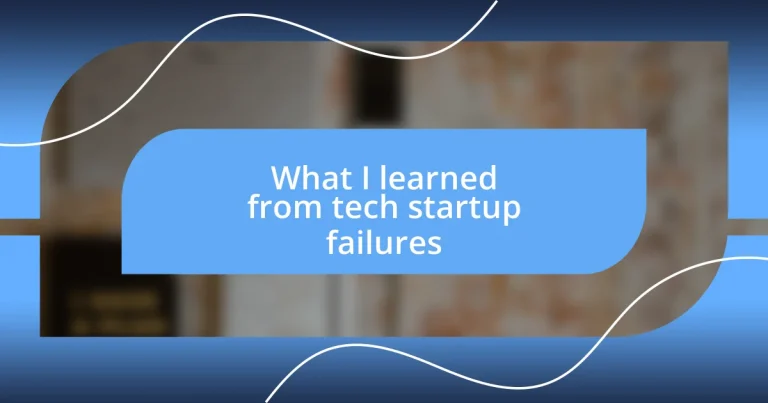Key takeaways:
- Understanding the emotional and psychological factors behind tech startup failures highlights the importance of market fit, timing, and team dynamics.
- Key lessons learned from failed startups emphasize the necessity of adaptability, customer feedback, and strong financial planning while fostering team cohesion.
- Effective strategies for future success include developing a clear vision, prioritizing tasks based on impact, and networking within the industry for collaboration and support.
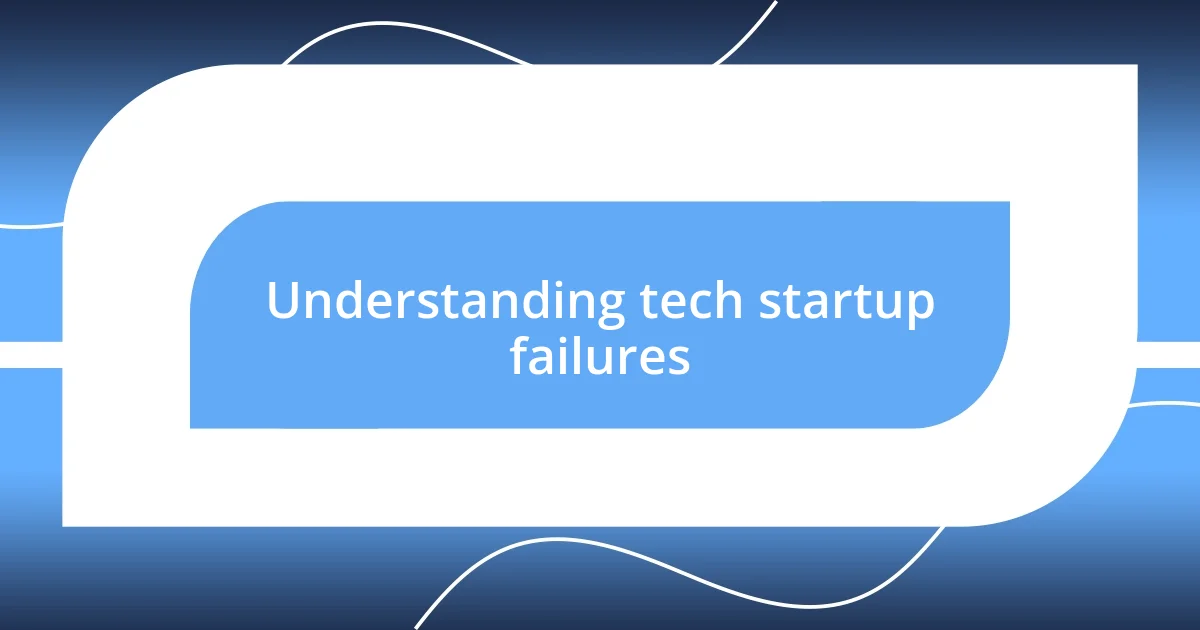
Understanding tech startup failures
Understanding tech startup failures often requires us to dig deep into their emotional and psychological dimensions. For instance, I vividly remember a time when a friend’s startup, fueled by passion yet lacking a robust business model, went under. One day, we were brainstorming ideas, filled with excitement, and the next, it all crumbled. How can you prepare for such unpredictable twists?
Failures can also stem from misreading the market, which I’ve seen firsthand. I guided another startup that had a brilliant product but missed the mark on timing; they entered when the market was saturated. It’s heartbreaking to watch dedicated teams put their heart and soul into something only to find out their timing was off. This raises an important question: How crucial is timing in a startup’s success?
Lastly, I find that the fear of failure often prevents entrepreneurs from taking necessary risks. I once hesitated to pursue a promising side project because of a past failure, feeling like I was dancing on the edge of the unknown. Isn’t it fascinating how these experiences shape our mindset? Understanding these elements can truly illuminate why so many startups do not make it.
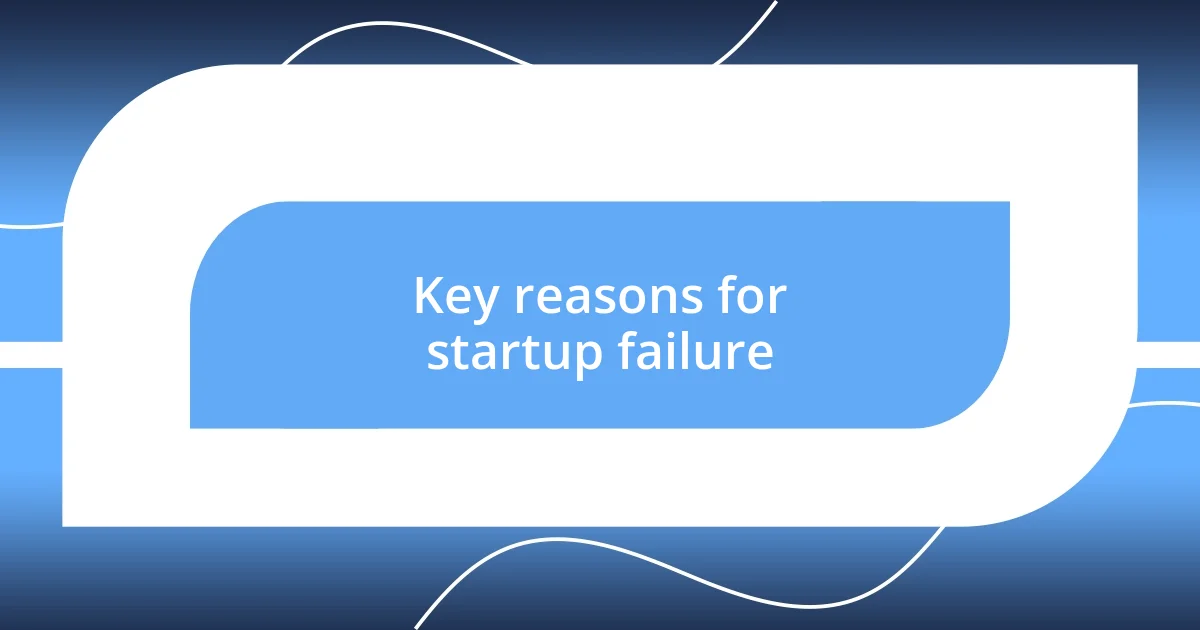
Key reasons for startup failure
One of the key reasons startups fail is poor market fit. I remember when I advised a passionate entrepreneur who had built a cutting-edge app. Despite its innovation, it struggled to attract users because it didn’t solve a pressing problem in their lives. It’s a tough pill to swallow, realizing that even the most advanced technology can miss the mark if it doesn’t resonate with its intended audience.
Another common pitfall is the lack of a financial cushion. I’ve witnessed too many startups dive headfirst into ambitious projects without adequate funding. This often leads to panic when unexpected costs arise. In the earlier days of my career, I invested in a tech company that didn’t account for these fluctuations. Without a financial buffer, they didn’t last long enough to prove their concept. Have you ever considered how critical a financial plan is to weather the storm?
Lastly, ineffective team dynamics can be a silent killer. There was a venture I followed closely where internal conflicts overshadowed their potential. They had brilliant ideas but struggled with communication and collaboration. I learned firsthand the importance of a cohesive team—it’s not just about individual talent but how those talents mesh together. A united approach can make a world of difference in steering a startup toward success.
| Key Reason for Failure | Description |
|---|---|
| Poor Market Fit | Products that don’t resonate with the target audience lead to a loss of interest and eventual failure. |
| Lack of Financial Cushion | Insufficient funding can hinder a startup’s ability to navigate unexpected challenges. |
| Ineffective Team Dynamics | Internal conflicts and poor communication can derail a startup’s vision and progress. |
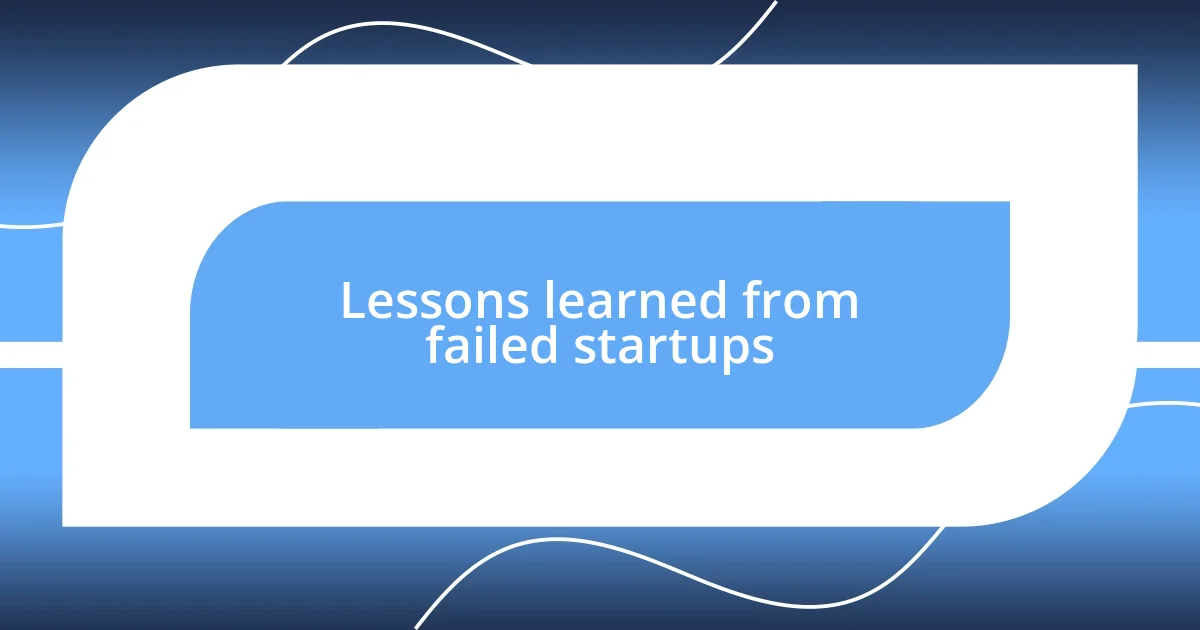
Lessons learned from failed startups
Learning from failed startups can be quite revealing. One lesson I’ve gleaned is the importance of adaptability. I recall a startup I was following that was fervently committed to their original vision, yet they failed to pivot when the market shifted. Watching them cling to their initial idea was painful; it felt like they were racing against time, oblivious to the changing landscape. This experience taught me that flexibility can mean the difference between survival and demise for a startup, highlighting how crucial it is to listen to feedback and remain open to change.
Consider these essential lessons learned from failed startups:
– Market Awareness: Staying in tune with market needs can guide your development.
– Emphasizing Customer Feedback: Incorporating user input can refine your product and boost engagement.
– Financial Planning: Developing a detailed budget can buffer against unforeseen costs.
– Team Cohesion: Prioritizing a strong team dynamic fosters collaboration and creativity.
– Embracing Failure as a Teacher: Each setback can offer invaluable lessons to refine future endeavors.
These insights resonate deeply with me; they often serve as guiding principles in my own projects.

Importance of market research
Understanding the importance of market research can’t be overstated. In my early days, I worked with a startup that launched a product with minimal research. I still remember the disappointment when their initial sales were a fraction of what they expected. They simply failed to understand who their customers were and what they really needed. Have you ever purchased something that felt right in the moment but didn’t fit into your life later? That’s what happened to them; they missed the core desires of their audience.
Market research is like a compass that helps navigate the vast sea of consumer preferences. I’ve seen startups thrive because they took the time to listen to potential users before launching. One such instance was a project where we conducted surveys and focus groups. It was eye-opening to see how our assumptions were often way off the mark. I realized how critical it is to engage with your target market early. It’s not just data; it’s about connecting. How well do you really know your audience?
Moreover, market research isn’t merely a one-time task; it should be ongoing. In my experience, I’ve watched companies that stayed attuned to their consumers adapt and flourish, while those that disregarded feedback floundered. When changes in user behavior emerged, the responsive companies tweaked their offerings and maintained relevance. Reflecting on this makes me wonder—are we truly committed to listening and evolving, or do we often rely on our own assumptions? That distinction can determine the life or death of a startup.
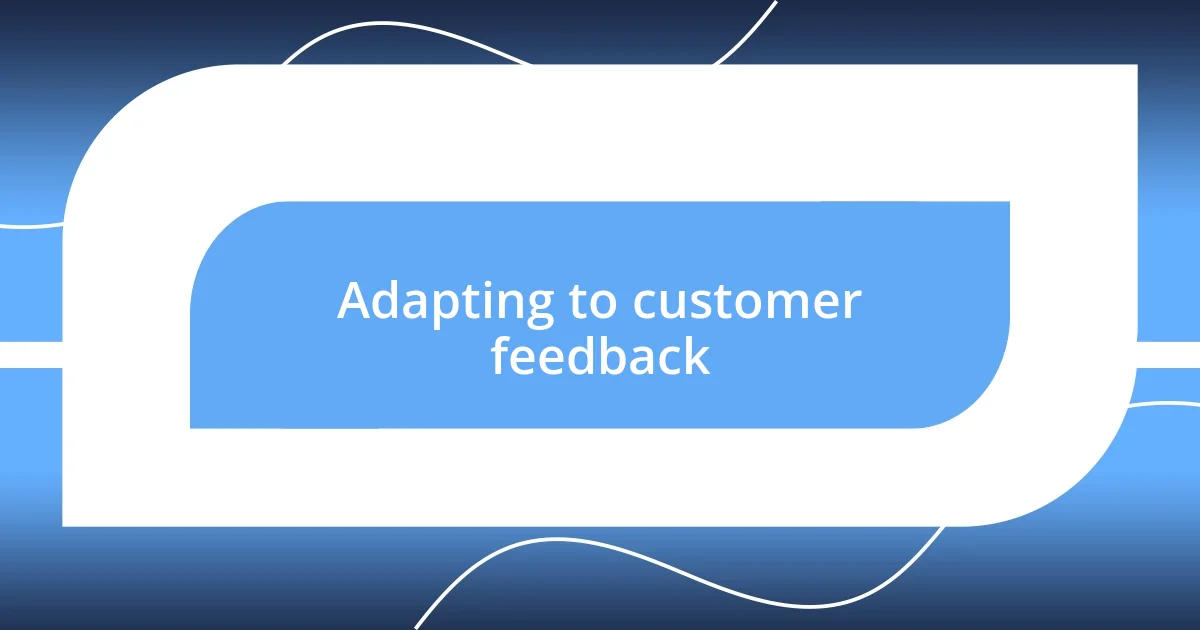
Adapting to customer feedback
The ability to adapt to customer feedback is a game changer for any startup. I remember working on a platform that initially catered to tech enthusiasts, but after hearing user input, we pivoted toward small business owners. It felt like a gamble at first, but the excitement of aligning our product with actual needs brought a sense of purpose that revitalized our team’s efforts.
Listening to customers isn’t just about gathering data; it’s about understanding emotions and intentions behind their words. Once, we received constructive criticism during beta testing that completely changed the trajectory of our app’s interface. Initially, I felt defensive, but I soon realized their feedback was a treasure trove of insights. Isn’t it fascinating how transparency can lead to breakthroughs we never even considered?
In my experience, the startups that flourish are often those that embrace feedback as part of their DNA. I’ve seen companies that hold regular feedback sessions where they actively encourage suggestions. The energy in those rooms is palpable, like a spark igniting innovative ideas. Have you ever thought about how a simple shift in approach could transform your project? Engaging deeply with customers creates a bond that turns them into advocates, which ultimately propels the business forward.
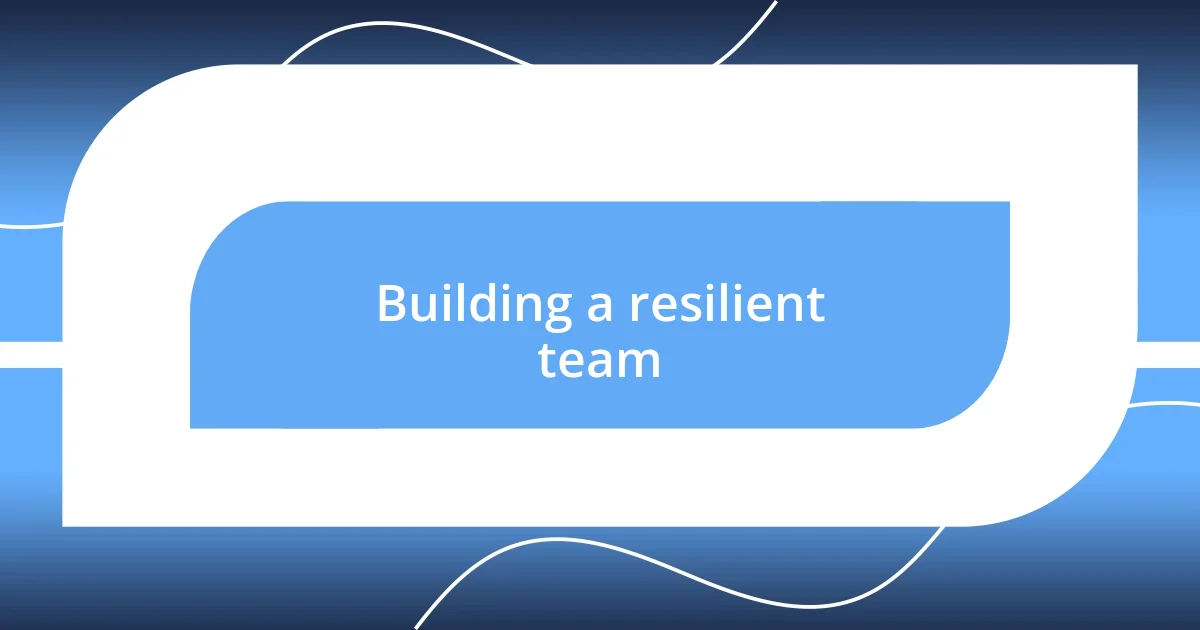
Building a resilient team
Building a resilient team starts with fostering an environment of trust and open communication. I vividly recall a tech startup where the team faced numerous setbacks. Instead of pointing fingers, we held weekly check-ins where we could candidly discuss our challenges. This openness not only strengthened our camaraderie but also allowed us to bounce back from failures collectively. Have you ever felt that a shared struggle can bond a group even tighter?
Another important aspect of resilience is the diversity of skills and perspectives within your team. In a previous venture, we had team members from various backgrounds, which led to creative solutions in tough situations. One time, a design hiccup threatened to derail our project. Thanks to the diverse viewpoints in our brainstorming session, we pivoted, creating a feature that became a key selling point. Isn’t it interesting how a mix of experiences can lead to unexpected innovations in times of crisis?
Lastly, instilling a growth mindset is crucial for building resilience. I remember a time when our project faced a seemingly insurmountable challenge, and it felt like the end of the road. Instead of succumbing to despair, we reframed our mindset. We viewed the challenge as an opportunity for growth. It was a turning point that not only salvaged our project but also empowered the team to tackle future obstacles with confidence. When was the last time you turned a setback into a stepping stone?
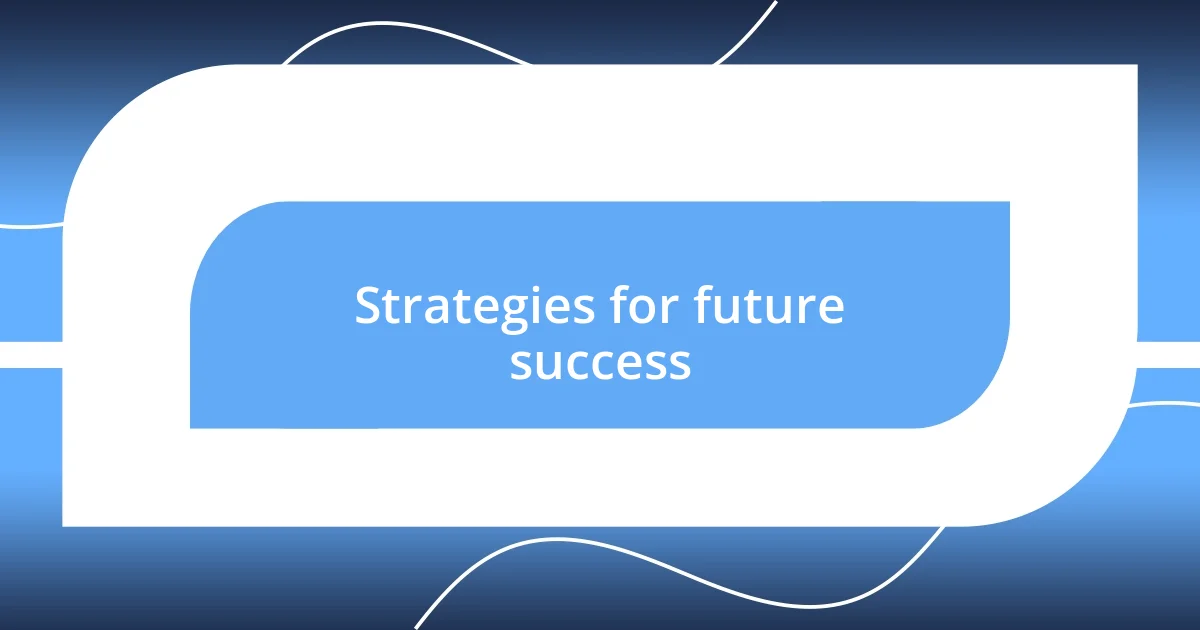
Strategies for future success
Developing a clear vision is essential for success in any tech startup. I once joined a team without an explicit direction, and the result was chaos. We spent countless hours on features that didn’t align with our core mission. I learned firsthand that a well-defined vision acts as a compass, guiding every decision and keeping the team focused on what truly matters. Have you ever felt lost in a project without a clear objective?
Prioritization of tasks based on impact and feasibility is another strategy I found invaluable. In a previous startup, we often chased flashy ideas, neglecting crucial aspects that could improve our product. By conducting a matrix analysis of tasks based on urgency and importance, I realized the power of focusing on what truly moves the needle. It was eye-opening to see how a little organization transformed our workflow. Isn’t it amazing how simply prioritizing can lighten the load and boost productivity?
Networking and building relationships within your industry is something I can’t stress enough. There was a period when I hesitated to reach out to others, assuming I needed to figure everything out on my own. When I finally attended industry meetups and conferences, the support and insights I gained were incredible. It’s as if a whole new world of resources opened up, and collaboration became a catalyst for innovation. Have you ever realized that sometimes, the key to success lies in connecting with others rather than going it alone?












